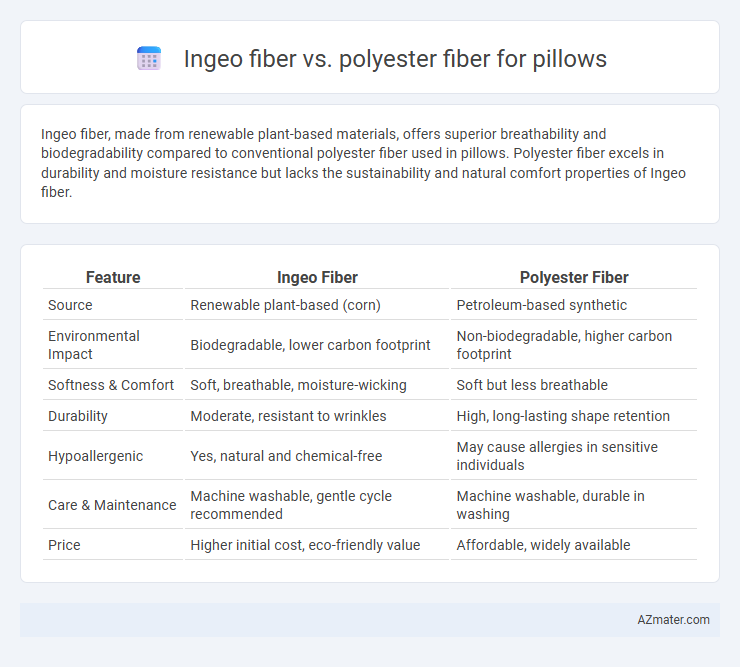Ingeo fiber, made from renewable plant-based materials, offers superior breathability and biodegradability compared to conventional polyester fiber used in pillows. Polyester fiber excels in durability and moisture resistance but lacks the sustainability and natural comfort properties of Ingeo fiber.
Table of Comparison
| Feature | Ingeo Fiber | Polyester Fiber |
|---|---|---|
| Source | Renewable plant-based (corn) | Petroleum-based synthetic |
| Environmental Impact | Biodegradable, lower carbon footprint | Non-biodegradable, higher carbon footprint |
| Softness & Comfort | Soft, breathable, moisture-wicking | Soft but less breathable |
| Durability | Moderate, resistant to wrinkles | High, long-lasting shape retention |
| Hypoallergenic | Yes, natural and chemical-free | May cause allergies in sensitive individuals |
| Care & Maintenance | Machine washable, gentle cycle recommended | Machine washable, durable in washing |
| Price | Higher initial cost, eco-friendly value | Affordable, widely available |
Introduction to Ingeo Fiber and Polyester Fiber
Ingeo fiber, derived from renewable plant-based sources such as corn, offers a sustainable alternative to traditional polyester fiber, which is synthesized from petrochemicals. Ingeo fiber provides natural breathability and biodegradability, making it an eco-friendly filling option for pillows, while polyester fiber is known for its durability, moisture resistance, and affordability. Both fibers cater to different consumer preferences, with Ingeo emphasizing environmental sustainability and polyester prioritizing performance and cost-effectiveness.
What is Ingeo Fiber?
Ingeo fiber is a plant-based material made from renewable resources like corn starch, offering a sustainable alternative to traditional synthetic fibers such as polyester. It provides excellent breathability, moisture-wicking properties, and biodegradability, making it ideal for eco-friendly pillows. Unlike polyester fiber, Ingeo fiber reduces environmental impact by consuming less energy during production and supporting carbon sequestration.
What is Polyester Fiber?
Polyester fiber is a synthetic material made from petrochemical products, widely used in pillow fillings due to its durability, moisture resistance, and affordability. It offers excellent resilience and maintains shape over time, providing consistent support and comfort. Compared to Ingeo fiber, polyester fibers are less environmentally friendly as they are non-biodegradable and derived from non-renewable resources.
Key Differences Between Ingeo and Polyester Fibers
Ingeo fiber, made from renewable plant-based materials, offers superior breathability and biodegradability compared to traditional petroleum-based polyester fiber, enhancing pillow comfort and sustainability. Polyester fiber provides greater durability and moisture resistance, making it ideal for long-lasting pillows that retain shape and support. Key differences include Ingeo's eco-friendly production with lower carbon footprint and polyester's synthetic resilience and ease of maintenance.
Comfort and Support: Ingeo vs Polyester Pillows
Ingeo fiber pillows offer superior breathability and moisture-wicking properties compared to polyester fiber pillows, enhancing overall sleep comfort by maintaining a cooler sleep environment. The supportive structure of Ingeo fibers provides consistent cushioning that adapts to head and neck contours, reducing pressure points more effectively than the synthetic polyester fill. Polyester fiber pillows tend to retain heat and may compress over time, leading to diminished support and less optimal spinal alignment.
Breathability and Temperature Regulation
Ingeo fiber, derived from renewable plant-based sources, offers superior breathability compared to traditional polyester fiber, allowing air to circulate more effectively within the pillow. This enhanced airflow helps regulate temperature by dissipating body heat and moisture, keeping users cooler and more comfortable throughout the night. Polyester fiber, while durable and inexpensive, tends to trap heat and moisture, which can reduce overall comfort and lead to overheating during sleep.
Eco-Friendliness and Sustainability Comparison
Ingeo fiber, derived from renewable plant-based materials like corn, offers superior biodegradability and a lower carbon footprint compared to petroleum-based polyester fiber, making it a more eco-friendly choice for pillows. The production of Ingeo fiber consumes less energy and emits fewer greenhouse gases, supporting sustainability goals by reducing dependency on fossil fuels and minimizing environmental impact. Polyester fiber, while durable and widely used, contributes to microplastic pollution and relies on non-renewable resources, posing significant challenges for long-term environmental sustainability.
Durability and Longevity of Both Fibers
Ingeo fiber, made from renewable plant-based materials, offers moderate durability with natural resistance to wear but tends to degrade faster under prolonged UV exposure and repeated washing compared to polyester fiber. Polyester fiber, a synthetic polymer, provides superior durability and longevity, maintaining structural integrity, shape, and loft over extended use and multiple laundering cycles. For pillows, polyester fiber significantly outperforms Ingeo fiber in terms of long-term resilience and resistance to environmental stressors, making it the preferred choice for lasting comfort.
Allergies and Health Considerations
Ingeo fiber, derived from renewable plant-based materials, offers hypoallergenic properties that reduce the risk of irritation and allergic reactions compared to polyester fiber, which can sometimes harbor dust mites and cause sensitivities. The natural breathability and moisture-wicking characteristics of Ingeo fiber enhance sleeping comfort by minimizing allergens and bacteria buildup, promoting better respiratory health. Polyester fibers, while durable and widely used, may trap allergens and contribute to skin irritation, making Ingeo fiber a healthier alternative for allergy-prone individuals.
Which Fiber is Better for Your Pillow?
Ingeo fiber, made from renewable plant-based materials, offers superior breathability and moisture-wicking properties compared to traditional polyester fiber, making it ideal for pillows that promote cooler, more comfortable sleep. Polyester fiber is durable and resistant to allergens, but it tends to trap heat and moisture, potentially leading to discomfort during extended use. Choosing Ingeo fiber for your pillow enhances sustainability and comfort by providing a softer, hypoallergenic filling that supports better airflow and temperature regulation.

Infographic: Ingeo fiber vs Polyester fiber for Pillow
 azmater.com
azmater.com